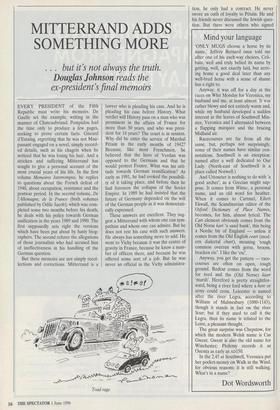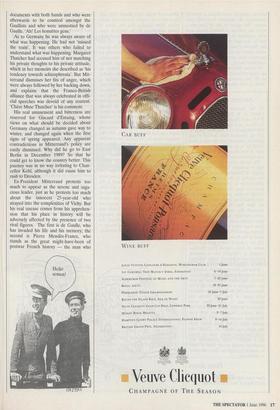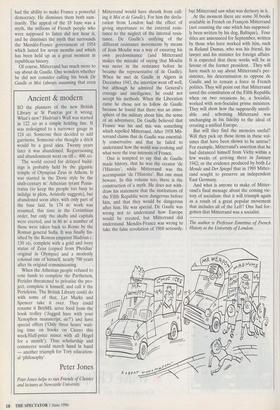MITTERRAND ADDS SOMETHING MORE
EVERY PRESIDENT of the Fifth Republic must write his memoirs. De Gaulle set the example, writing in the manner of Chateaubriand. Pompidou had the time only to produce a few pages, seeking to prove certain facts. Giscard d'Estaing, regretting that he was not Mau- passant engaged on a novel, simply record- ed details, such as his chagrin when he noticed that he was losing his hair. And a stricken and suffering Mitterrand has sought to give a personal account of the most crucial years of his life. In the first volume Memoires Interrompus, he replies to questions about the French defeat of 1940, about occupation, resistance and the postwar period. In the second volume, De l'Allemagne, de la France (both volumes published by Odile Jacob), which was com- pleted some two months before his death, he deals with his policy towards German unification in the years 1989 and 1990. The first supposedly sets right the versions which have been put about by hasty biog- raphers. The second refutes the allegations of those journalists who had accused him of ineffectiveness in his handling of the German question.
But these memoirs are not simply recol- lections and corrections. Mitterrand is a lawyer who is pleading his case. And he is pleading his case before History. What verdict will History pass on a man who was prominent in the affairs of France for more than 50 years, and who was presi- dent for 14 years? The court is in session. Why did he enter the service of Marshal Petain in the early months of 1942? Because, like most Frenchmen, he believed that the hero of Verdun was opposed to the Germans and that he would protect France. What was his atti- tude towards German reunification? As early as 1981, he had evoked the possibili- ty of it taking place, and before then he had foreseen the collapse of the Soviet Empire. In 1989 he had insisted that the future of Germany depended on the will of the German people as it was democrati- cally expressed. These answers are excellent. They sug- gest a Mitterrand with whom one can sym- pathise and whom one can admire. But he does not rest his case with such answers. He always has something more to add. He went to Vichy because it was the centre of gravity in France, because he knew a num- ber of officers there, and because he was offered some sort of a job. But he was never an official in the Vichy administra- Toad rage. tion, he only had a contract. He never swore an oath of loyalty to Pdtain. He and his friends never discussed the Jewish ques- tion. But there were others who signed documents with both hands and who were afterwards to be counted amongst the Gaullists and who were amnestied by de Gaulle. `Ah! Les honnetes gens.'
As to Germany he was always aware of what was happening. He had not 'missed the train'. It was others who failed to understand what was happening. Margaret Thatcher had accused him of not matching his private thoughts to his private attitude, which in her memoirs she described as 'his tendency towards schizophrenia'. But Mit- terrand dismisses her fits of anger, which were always followed by her backing down, and explains that the Franco-British alliance that was always celebrated in offi- cial speeches was devoid of any content. `Chere Mme Thatcher' is his comment.
His real amusement and bitterness are reserved for Giscard d'Estaing, whose views on what should be decided about Germany changed as autumn gave way to winter, and changed again when the first signs of spring appeared. Any apparent contradictions in Mitterrand's policy are easily dismissed. Why did he go to East Berlin in December 1989? So that he could get to know the country better. This journey was in no way irritating to Chan- cellor Kohl, although it did cause him to rush to Dresden.
Ex-President Mitterrand protests too much to appear as the serene and saga- cious leader, just as he protests too much about the innocent, 25-year-old who strayed into the complexities of Vichy. But his real unease comes from his apprehen- sion that his place in history will be adversely affected by the presence of two rival figures. The first is de Gaulle, who has invaded his life and his memory; the second is Pierre Mendes-France, who stands as the great might-have-been of postwar French history — the man who had the ability to make France a powerful democracy. He dismisses them both sum- marily. The appeal of the 18 June was a myth, the millions of French people who were supposed to listen did not hear it, and he dismisses the myth that surrounds the Mendes-France government of 1954 which lasted for seven months and which has been held up as a great moment in republican history.
Of course, Mitterrand has much more to say about de Gaulle. One wonders whether he did not consider calling his book De Gaulle et Moi (always assuming that even Mitterrand would have shrunk from call- ing it Mai et de Gaulle). For him the decla- ration from London had the effect of giving importance to the external resis- tance to the neglect of the internal resis- tance. De Gaulle's unifying of the different resistance movements by means of Jean Moulin was a way of ensuring his own predominance (and Mitterrand makes the mistake of saying that Moulin was never in the resistance before he became the representative of de Gaulle). When he met de Gaulle in Algiers in December 1943, the interview went off well, but although he admired the General's courage and intelligence, he could not accept his methods. When the Liberation came he chose not to follow de Gaulle because he found that there was an atmo- sphere of the military about him, the sense of an adventurer. De Gaulle believed that France was his and this was something which repelled Mitterrand. After 1958 Mit- terrand claims that de Gaulle was essential- ly conservative and that he failed to understand how the world was evolving and what were the true interests of France.
One is tempted to say that de Gaulle made history, that he was the creator 'de l'Histoire', while Mitterrand was the accompanist 'de l'Histoire'. But one must beware. In this volume too, there is the construction of a myth. He does not with- draw his statement that the institutions of the Fifth Republic were dangerous before him, and that they would be dangerous after him. He was special. De Gaulle was wrong not to understand how Europe would be created, but Mitterrand did understand. Mendes-France was wrong to take the false revolution of 1968 seriously, but Mitterrand saw what was derisory in it.
At the moment there are some 30 books available in French on Francois Mitterrand (not counting the one which has supposed- ly been written by his dog, Baltique). Four titles are announced for September, written by those who have worked with him, such as Roland Dumas, who was his friend, his lawyer and his minister for foreign affairs. It is expected that these works will be in favour of the former president. They will have much to say about Mitterrand's per- sistence, his determination to oppose de Gaulle and to remain a force in French politics. They will point out that Mitterrand saved the constitution of the Fifth Republic when on two occasions he, a Socialist, worked with non-Socialist prime ministers. They will show how the supposedly unreli- able and scheming Mitterrand was unchanging in his fidelity to the ideal of creating a unified Europe.
But will they find the memoirs useful? Will they pick up those items in these vol- umes that have been shown to be untrue? For example, Mitterrand's assertion that he had distanced himself from Vichy within a few weeks of arriving there in January 1942; or the evidence produced by both Le Monde and Der Spiegel that in 1989 Mitter- rand sought to preserve an independent East Germany.
And what is anyone to make of Mitter- rand's final message about the coming vic- tory of socialism: that it will triumph again as a result of a great popular movement that includes all of the Left? One had for- gotten that Mitterrand was a socialist.
The author is Professor Emeritus of French History at the University of London.




























































 Previous page
Previous page